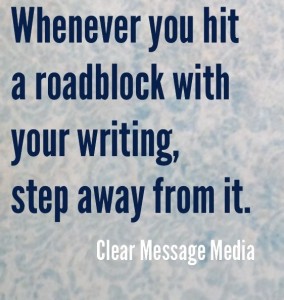By Jennifer Henderson
 I work part-time as a tutor at a university writing center. We see students who are at all stages of the writing process—researching a topic, developing a thesis, or proofreading the final product. But one of the main reasons students visit the center is for help with overcoming writer’s block.
I work part-time as a tutor at a university writing center. We see students who are at all stages of the writing process—researching a topic, developing a thesis, or proofreading the final product. But one of the main reasons students visit the center is for help with overcoming writer’s block.
Writer’s block has happened to most of us at one time or another, whether you’re writing a research paper, an e-mail, or a blog for your business. Not knowing how to begin, what to write next, or just getting stuck with your writing is not fun. But there is hope. The following strategies have helped me (and the students I tutor) overcome writer’s block.
Talk it out
Years ago, one of my best friends applied to medical school and had to write an application essay. He didn’t know where to begin and was paralyzed with fear about getting started. He is a talented scientist, but found writing a challenge. To help him get past his fear, I asked him to just talk to me about what he wanted to say. Verbalizing the main points of his essay gave him the confidence to begin. He was able to write his essay (and even got accepted to medical school).
Freewriting
Sometimes when I don’t know what to write next, I set a timer for five minutes. I start typing on my keyboard and let ideas on the topic flow until the timer goes off. I write words and sentences, but I don’t worry about making my points sound good or even make sense. I also ignore punctuation and grammar. This strategy usually helps me move forward with my writing.
Ignore grammar when battling writer’s block
Grammar is very important, especially in social media, as I wrote in a previous blog post. But when it comes to overcoming writer’s block, ignore grammar (at least at first). Thoughts don’t flow as easily if you’re constantly checking to make sure every sentence you write is grammatically correct. Proofread for grammar after you’re done writing.
Take a break
The National Council of Teachers of English (NCTE) gives excellent advice on overcoming writers’ block. One of NCTE’s suggestions is to take a break. Whenever you hit a roadblock with your writing, step away from it. I like to sometimes leave my writing until the next day. Sleeping on the subject gives me a fresh perspective when I return to my writing the following morning. Giving your brain a break and time away from your project is sometimes all it takes to get past writer’s block.
So, how do you overcome writer’s block? What strategies have you found helpful when you get stuck in your writing? We’d love to hear from you in the comments section below.


Great post, Jennifer! I agree that you need to take a break and walk away from it for awhile. In a writing class I took recently, the instructor echoed your advice by saying that we need to just write it down. Promise yourself you’ll make it pretty later, but first just get it down!
[…] On the flip side, try not to ignore emails yourself. When you don’t know what to write, step away from the computer and return to the message later, as we mention in a previous blog post about overcoming writer’s block. […]